How Does Scraping Travel Data for Airline Fare Forecasting Improve Pricing Strategies?
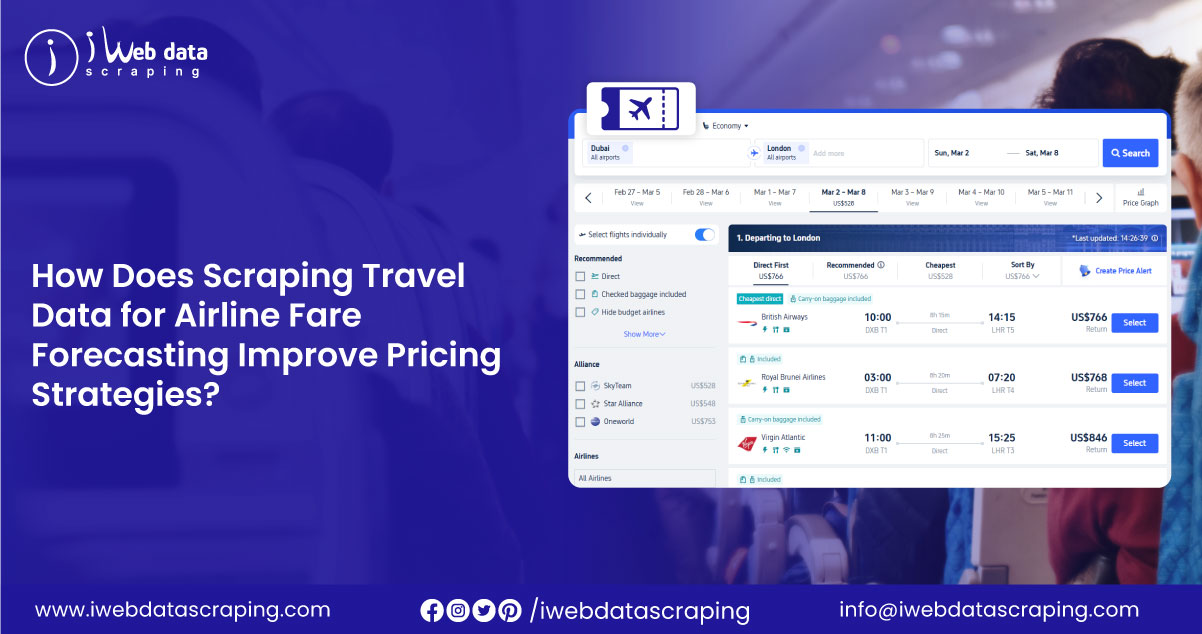
Introduction
The airline industry is dynamic, with ticket prices constantly fluctuating due to demand, seasonality, competitor pricing, fuel costs, and geopolitical events. Scraping Travel Data for Airline Fare Forecasting has become essential for travel agencies, airlines, and budget-conscious travelers to secure the best deals. By Extracting Airline Prices, businesses can collect vast datasets, analyze pricing patterns, and generate accurate predictions to optimize booking strategies. Web Scraping for Airfare Price Trends helps identify market trends, detect fare changes, and provide real-time insights for competitive pricing. However, challenges such as anti-scraping measures, data accuracy, and regulatory compliance must be addressed. Leveraging data scraping for airfare forecasting offers a significant competitive advantage, enabling businesses to enhance pricing models, maximize revenue, and improve customer satisfaction. As the travel industry evolves, extracting and analyzing airline pricing data will be crucial for more intelligent decision-making and cost-effective travel planning.
The Importance of Airline Fare Forecasting

Airfare forecasting is essential for businesses and consumers seeking informed travel decisions. Whether airlines optimize pricing strategies or travelers secure cost-effective tickets, accurate fare predictions provide significant advantages. The ability to analyze historical pricing trends and real-time fluctuations enhances decision-making across the travel industry.
- Cost Savings for Travelers: By leveraging Real-Time Airfare Extraction, travelers can monitor ticket prices and identify the best time to book flights. Predicting price fluctuations allows budget-conscious passengers to secure tickets at the lowest possible fares, avoiding last-minute price surges.
- Optimized Pricing Strategies for Airlines: Data Extraction for Airline Price Optimization is crucial for maximizing revenue for airlines. By analyzing competitor pricing, demand patterns, and seasonal trends, airlines can dynamically adjust fares to remain competitive while ensuring profitability.
- Competitive Edge for Travel Agencies: Travel agencies gain an advantage by using Flight Fare Data Scraping to give customers insights into the best booking times. Accurate forecasts allow agencies to recommend ideal fare windows, attracting more clients and boosting sales.
- Data-Driven Decision-Making: Through Travel Data Scraping Services, businesses can refine marketing and sales strategies using historical and real-time pricing data. This data-driven approach helps optimize promotions, improve customer engagement, and enhance overall business performance.
The Role of Web Scraping in Airline Fare Forecasting
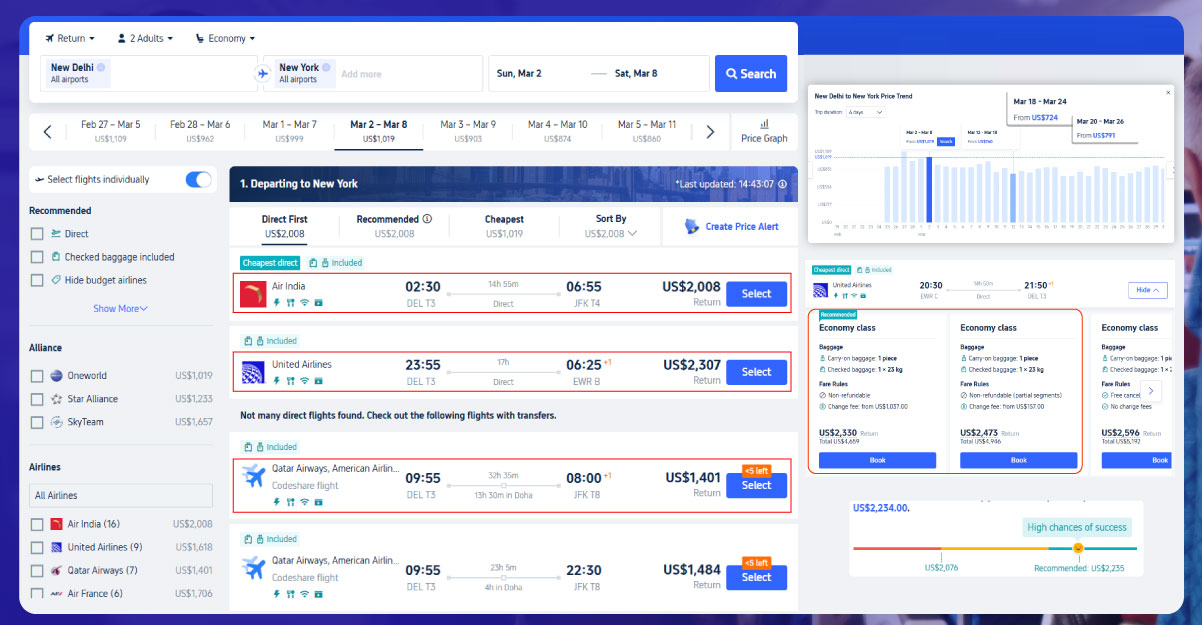
Web scraping is a powerful technique to extract large volumes of fare-related data from travel websites, airline portals, and aggregator platforms. Businesses gain access to real-time and historical pricing information by automating the data collection process, enabling them to develop predictive models for fare forecasting. The major areas where web scraping contributes to airfare prediction include:
- Tracking Price Trends: Scraping travel data helps track fare trends, identifying fluctuations based on weekdays, holidays, and peak seasons. This data is invaluable for predicting the best times to book flights at the lowest cost.
- Monitoring Competitor Pricing: Airlines continuously adjust their pricing strategies to remain competitive. Scraping competitor airfare data enables airlines and travel agencies to analyze price changes, helping them refine their pricing models.
- Assessing Demand and Availability: Demand directly impacts flight prices. Web scraping allows businesses to monitor seat availability and demand trends to determine the optimal pricing points.
- Analyzing Historical Data: Historical fare data helps forecast future prices by identifying patterns and price behaviors under different circumstances, such as off-peak travel or high-demand holiday periods.
- Understanding Market Influences: Fuel costs, geopolitical events, and airline mergers influence fare pricing. Businesses can correlate these factors with price changes by scraping news sources and industry reports.
Challenges in Scraping Travel Data for Fare Forecasting
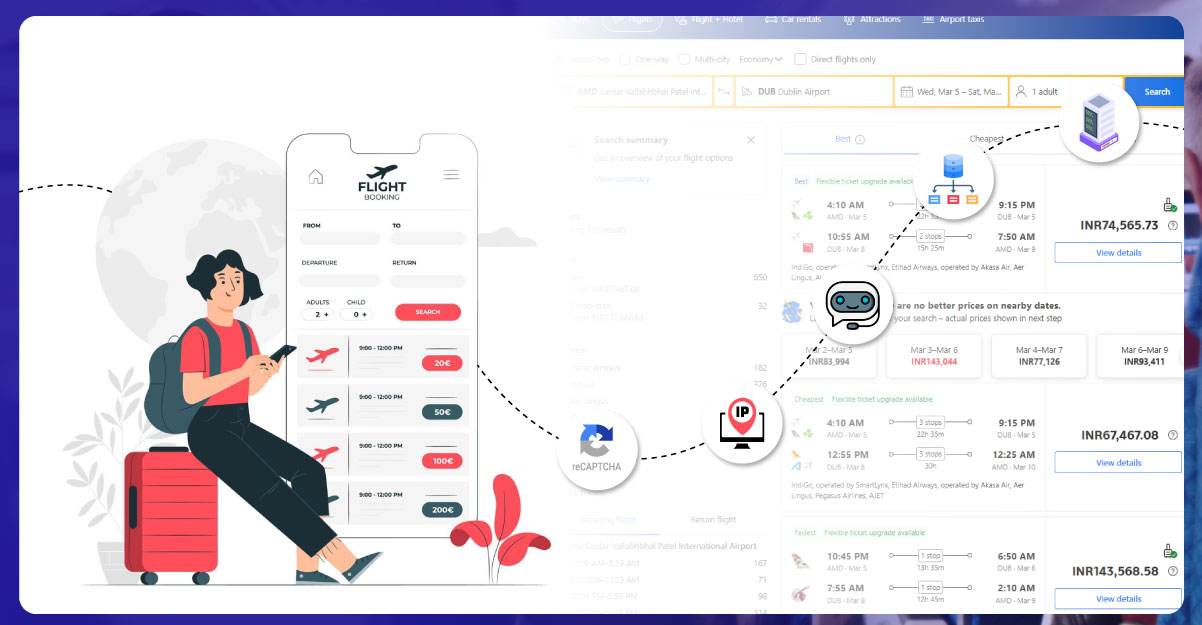
While web scraping is a highly effective tool for airline fare forecasting, several challenges must be addressed:
- Website Restrictions and Anti-Scraping Measures: Many airline and travel websites implement anti-scraping mechanisms such as CAPTCHAs, IP blocking, and bot-detection systems to prevent automated data extraction.
- Frequent Price Changes: Airline ticket prices fluctuate frequently, sometimes within minutes. Ensuring timely data collection is essential to maintain accuracy.
- Data Structure Variability: Different travel websites display fare information in varied formats, making data standardization and cleaning a crucial step before analysis.
- Large Volumes of Data Processing: Scraping large datasets requires robust infrastructure and efficient data storage solutions to handle the vast amount of collected information. Legal and Ethical Considerations: Not all websites permit web scraping. When extracting fare data, understand and comply with legal regulations, such as terms of service and data protection laws.
Boost your travel business with data-driven insights—leverage our scraping services for accurate airfare forecasting today!
Benefits of Scraping Travel Data for Fare Forecasting
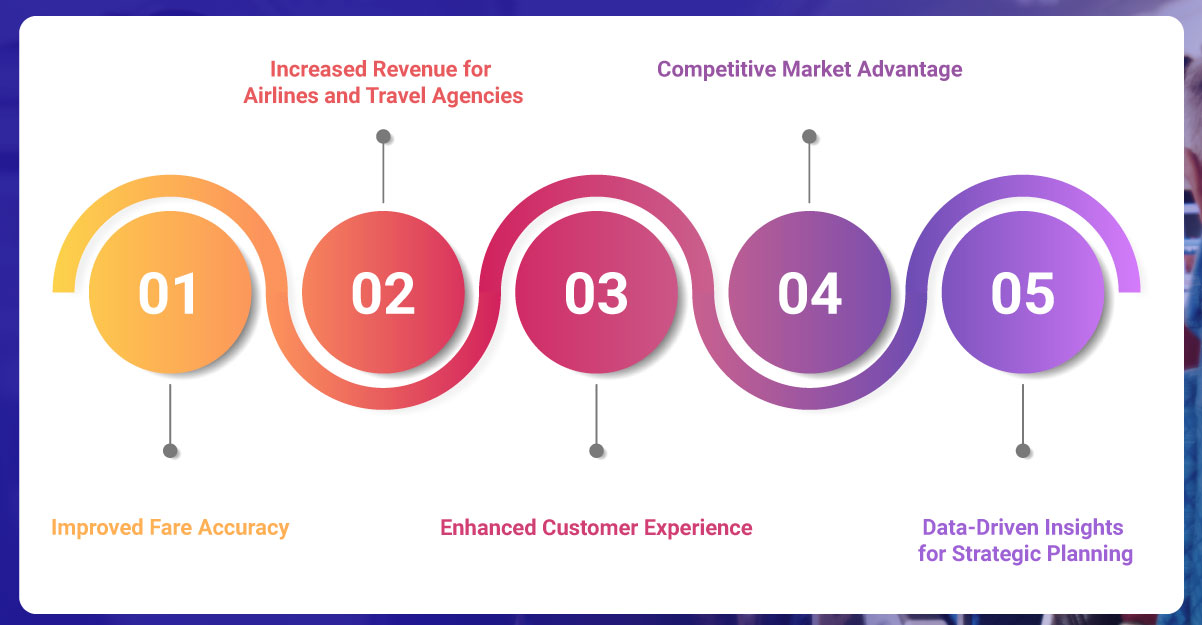
Despite the challenges, businesses that successfully implement web scraping for airfare prediction gain several advantages:
- Improved Fare Accuracy: Access to real-time and historical fare data ensures precise forecasting, allowing businesses and travelers to make well-informed decisions.
- Increased Revenue for Airlines and Travel Agencies: Airlines can optimize ticket pricing by understanding pricing trends, and travel agencies can offer better deals, boosting their profitability.
- Enhanced Customer Experience: Accurate fare predictions empower travelers with insights, helping them book tickets at the best prices while improving their overall travel planning experience.
- Competitive Market Advantage: Businesses leveraging web scraping for fare forecasting stay ahead by monitoring market trends, competitor pricing, and customer preferences.
- Data-Driven Insights for Strategic Planning: Analyzing scraped fare data helps businesses refine their marketing campaigns, pricing strategies, and expansion plans based on industry trends.
Ethical Considerations and Compliance
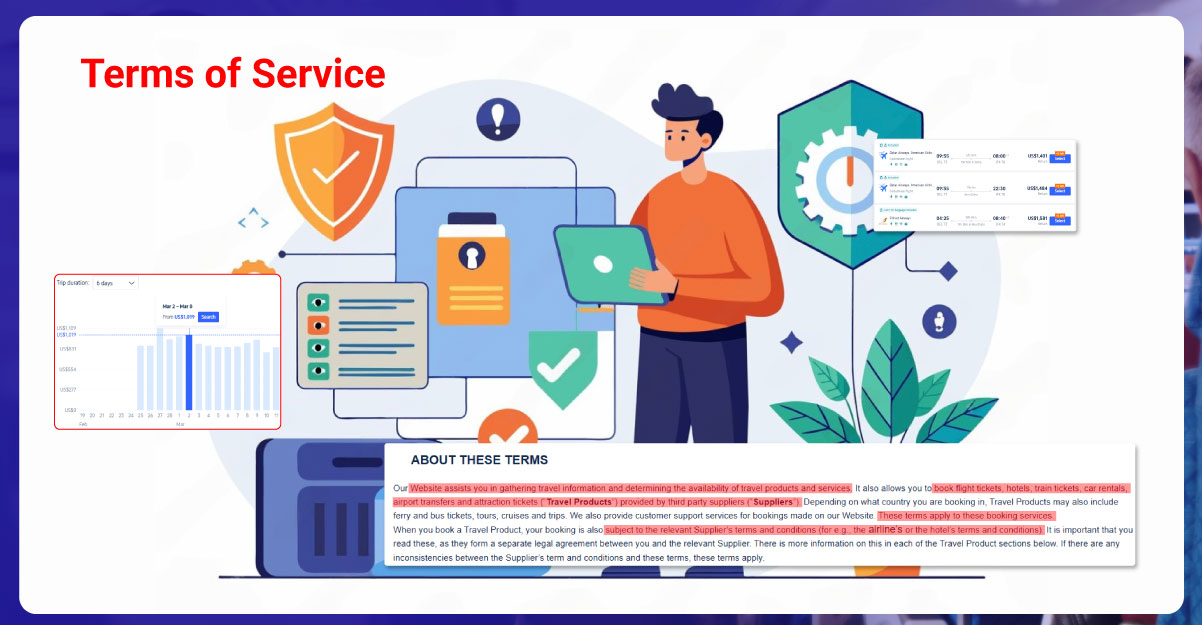
When scraping travel data for airfare forecasting, businesses must ensure ethical practices and legal compliance:
- Respect Website Terms of Service: Always check the terms and conditions of websites before extracting data.
- Use Publicly Available Data: Focus on aggregators and travel portals that provide accessible fare information.
- Implement Rate Limiting: Avoid excessive scraping requests that may disrupt a website's operations.
- Leverage APIs When Available: Some travel platforms provide official APIs for legally accessing fare data.
Future Trends in Airline Fare Forecasting

As technology advances, airfare forecasting methods continue to evolve. The future of airline fare prediction is expected to see improvements through:
- AI and Machine Learning Integration: AI-driven models will enhance prediction accuracy by analyzing vast fare data.
- Blockchain for Transparency: Blockchain technology may improve data transparency, ensuring reliable and tamper-proof pricing insights.
- Real-Time Data Processing: Faster data scraping and processing technologies will enable instant fare forecasting updates.
- Enhanced Data Partnerships: Airlines, travel agencies, and data providers may collaborate to create more comprehensive fare prediction models.
How Does iWeb Data Scraping Help You?
1. Real-Time Airfare Monitoring – Our services provide up-to-date pricing information, helping businesses track and analyze airfare fluctuations.
2. Competitor Price Analysis – We extract competitor fare data, allowing airlines and travel agencies to adjust their pricing strategies effectively.
3. Historical Data Collection— By gathering past airfare trends, we help businesses predict future price movements and make smarter booking decisions.
4. Demand and Seasonality Insights – Our scraping solutions analyze demand patterns and seasonal trends to optimize fare forecasting.
5. Customized Travel and Tour Datasets – We provide tailored datasets for airlines, travel agencies, and OTAs to enhance market research and decision-making.
6. Compliance and Accuracy - Our advanced scraping techniques ensure accurate data extraction while adhering to legal and ethical web scraping practices.
Conclusion
Scraping travel data for airline fare forecasting is a game-changer for businesses and travelers seeking to optimize pricing and booking strategies. By leveraging Travel Data Intelligence, companies can access real-time and historical pricing trends, competitor insights, and demand fluctuations, enabling more accurate fare predictions. Additionally, analyzing Travel and Tour Datasets helps businesses refine their pricing models and enhance customer recommendations. However, challenges such as website restrictions, data variability, and legal considerations must be carefully managed. As technology advances, integrating AI, machine learning, and blockchain into airfare forecasting will further enhance precision, creating new opportunities for the travel industry to thrive in a data-driven world.
Experience top-notch web scraping service and mobile app scraping solutions with iWeb Data Scraping. Our skilled team excels in extracting various data sets, including retail store locations and beyond. Connect with us today to learn how our customized services can address your unique project needs, delivering the highest efficiency and dependability for all your data requirements.







